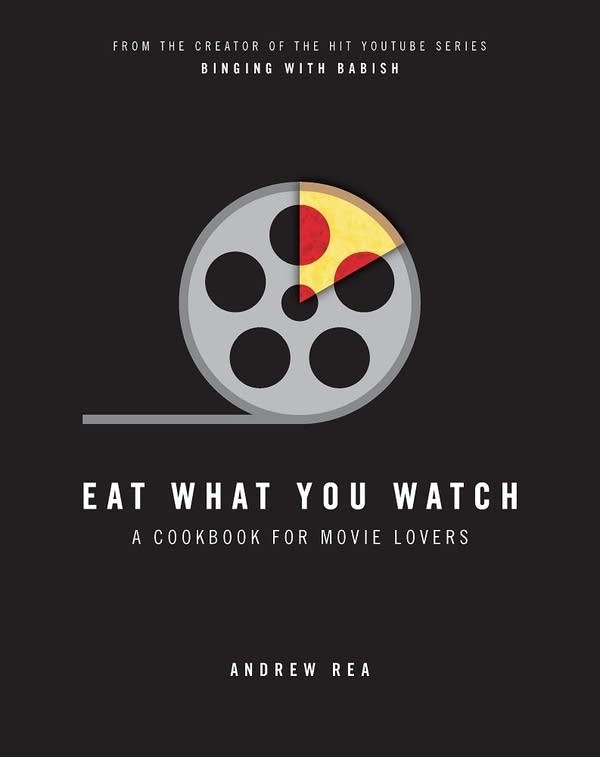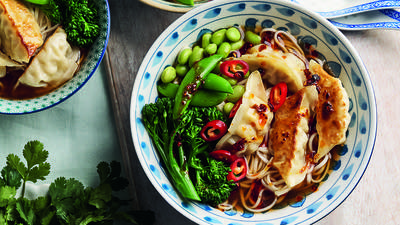
Throughout the history of movies and television, food has often been a central character and theme. Who could forget the escargots in Pretty Woman, Goodfellas’s prison dinner party meal of pasta and meatballs, the pastrami sandwich at Katz’s Delicatessen during “that scene” in When Harry Met Sally, or Buddy the Elf’s insane breakfast dessert pasta? Bringing those famous film dishes to your home dinner table has become an obsession for Andrea Rea. Fans know Rea as the creator of the YouTube series, Binging with Babish, a cooking show in which Rea recreates – and provides recipes for – silver screen cuisine. He attended film school and is a crazed home cook hobbyist, so cooking videos seemed a natural fit for him. And with more than two million subscribers in just two years of production, the show clearly speaks to other cinephile foodies. Associate digital producer Chip Walton talked with Rea about reverse engineering cinematic cuisine, food consultants on Hollywood sets, and the inspiration for three of Rea’s recipes: Boeuf Bourguignon (Julie & Julia), Confit Byaldi (Ratatouille), and Tonkotsu Ramen (Tampopo) from his cookbook Eat What You Watch.
Chip Walton: For food inspired by television and film, tell me about the process of recreating - possibly deconstructing and reconstructing - something that you may have only seen for a few minutes on screen and about which you may have very little sensory information.
Andrew Rea: It boils down to being as rigorously accurate as possible. In the case of, say, Ratatouille, that dish, confit byaldi with its particular plating and preparation, was created by Thomas Keller. So, it's a matter of finding out who solved it as the food guru on Ratatouille, and it was Thomas Keller, then looking at pics for confit byaldi. That's an opportunity to be extremely accurate.
In other cases, like with Rick & Morty's Szechuan Sauce – a promotional dipping sauce released by McDonald's in the late 1990s – there was a craze that swept through the internet about Szechuan sauce, prompting McDonald's to release a couple special bottles to five contest winners. One of them sent me a sample with a picture of the ingredients list. It was a matter of reverse engineering. It's all a mixture of educated guesses, rigorous research, and culinary creativity.
 Andrew Rea
Photo: Katie McKinney
Andrew Rea
Photo: Katie McKinney
CW: When it comes to cooking skills, you say that you’re a self-taught hobbyist.
AR: I've tried all different methods of learning, and over the years I've settled on some of the resources that I know are going to give me the most sound and reliable techniques. Then it's just a matter of adapting those where necessary and mixing and matching recipes to fit the need for that particular project. Most of my techniques are sourced from elsewhere. Whenever I'm using a very specific technique that I feel was pioneered by somebody else, I definitely give them a shout-out.
CW: It was interesting what you said about Chef Thomas Keller working as the food consultant on Ratatoullle. Do a lot of movies and TV shows have a food consultant? If so, what about that niche industry surprised you as you research the book?
AR: Most movies and TV shows – specifically ones about food – will have a professional food consultant. Thomas Keller worked on Ratatouille and the Adam Sandler movie Spanglish, where Sandler plays a chef. I most recently met with [director/actor/writer] Jon Favreau and Chef Roy Choi. Roy Choi served as the food consult for Chef, because he is seen as the godfather of the food truck scene, and Chef is all about a chef embarking on a food truck journey. I wasn't surprised to find that out, but I was excited to see how dedicated filmmakers and content creators are to making things feel genuine by bringing in professionals who have a profound understanding and love for food to lend their knowledge to the story.
CW: What is the cultural importance of food both as a character and as a source of sustenance throughout the history of television and movies?
AR: Food can and does play a major role in a lot of movies, and by role, I mean literally a character. Something with a personality, something that has an effect on the people around it, something that drives the story. More than that, it's something that we as audience members can directly relate to. It’s the most tangible and accessible piece of your favorite fictions and stories that you can experience yourself. That's what makes food so relatable and makes us crave it so much. With Jurassic Park, there's absolutely none of that movie that you can take home with you, except for a few choice recipes. Seeing the jellies on screen and the Chilean sea bass, these are things that you can actually try yourself. You can't run from dinosaurs, but you can try that.
 Try Andrew Rea's cinematically inspired recipes: Boeuf Bourguignon from Julie & Julia, Confit Byaldi from Ratatouille and Tonkotsu Ramen from Tampopo.
Photos: Scott Gordon Bleicher
Try Andrew Rea's cinematically inspired recipes: Boeuf Bourguignon from Julie & Julia, Confit Byaldi from Ratatouille and Tonkotsu Ramen from Tampopo.
Photos: Scott Gordon Bleicher
CW: The Splendid Table chose to feature three recipes from your cookbook, all of which are inspired by movies that revolve around food: Boeuf Bourguignon from Julie & Julia, Confit Byaldi from Ratatouille and Tonkotsu Ramen from Tampopo. Is there any behind-the-scenes advice you would suggest for anyone trying to capture the essence of those dishes?
AR: Those three recipes are all born of a deep passion for food. With the Tampopo ramen, in the movie they're examining it, breaking down every little element; they thank it and apologize to the pork. The ramen master is in that scene.
In Ratatouille, it's the fullest expression of the rat-chef's love for food and his attempt to reach the cold-hearted critic who has lost his way in understanding what makes food great. Sure, it tastes good, but it's also totally worth trying because it’s so rewarding to try, fail, try again, and have it work – to have it plated up right. It took three attempts for me to get that perfect plating for my show; it’s really rewarding for that to finally happen.
The boeuf bourguignon is from a movie about a woman who changes her entire life by paying attention to and enjoying the creation and eating of food and her connection with Julia Child, who revolutionized how we all cook at home.
The thing that I could recommend for those who want to try the recipes at home – and this isn't like a hot tip on a technique or anything – is to really pay attention to what you're doing. Not in an overly focused way, but truly engage yourself in what you're doing. Feel the lore behind each one of those dishes, their storied histories, and the reason why you're making them. The passion shown for those foods in the movie is so great that you felt that you wanted to try it yourself. Throw yourself into it. Great cooking is about bringing yourself closer to your food, bringing those around you closer to your food, and enjoying the process as much as the outcome.
 Eat What You Watch by Andrew Rea
Eat What You Watch by Andrew Rea
CW: Why draws millions of people to the production and presentation of these the dishes in your videos?
AR: I have a hard time talking about my own work and why people like it, but from what people are telling me and what I see in the comments, there's a drought of information-rich, entertaining, dynamic content online. Most of the stuff on the internet is vloggers, people who are trying to be personalities, first and foremost. I set out to make a show that was truly about the food. Any role that I play in it, beyond my arms, is going to be incidental. This is why I wear a black apron and generally frame my face out of the shot; I am literally the backdrop for the food.
I think people are encouraged by the show, because they know that I'm an amateur. A lot of people know that I don't have any formal training, so it gives them the confidence – “If he can do it, I can do it.” Some episodes in particular, like Pasta Aglio e Olio from Chef (watch video) is a particularly powerful recipe. Thousands of people have tagged me on Instagram, Reddit, and Facebook, saying they tried cooking for the first time ever because of that recipe. It's just seven ingredients, but it’s such an important dish. It's a simple recipe that surprises you with how good it is. It encourages you to try bigger and more difficult things.
Before you go...
Each week, The Splendid Table brings you stories that expand your world view, inspire you to try something new, and show how food connects us all. We rely on your generous support. For as little as $5 a month, you can have a lasting impact on The Splendid Table. And, when you donate, you’ll join a community of like-minded individuals who love good food, good conversation, and kitchen companionship. Show your love for The Splendid Table with a gift today.
Thank you for your support.
Donate today for as little as $5.00 a month. Your gift only takes a few minutes and has a lasting impact on The Splendid Table and you'll be welcomed into The Splendid Table Co-op.




